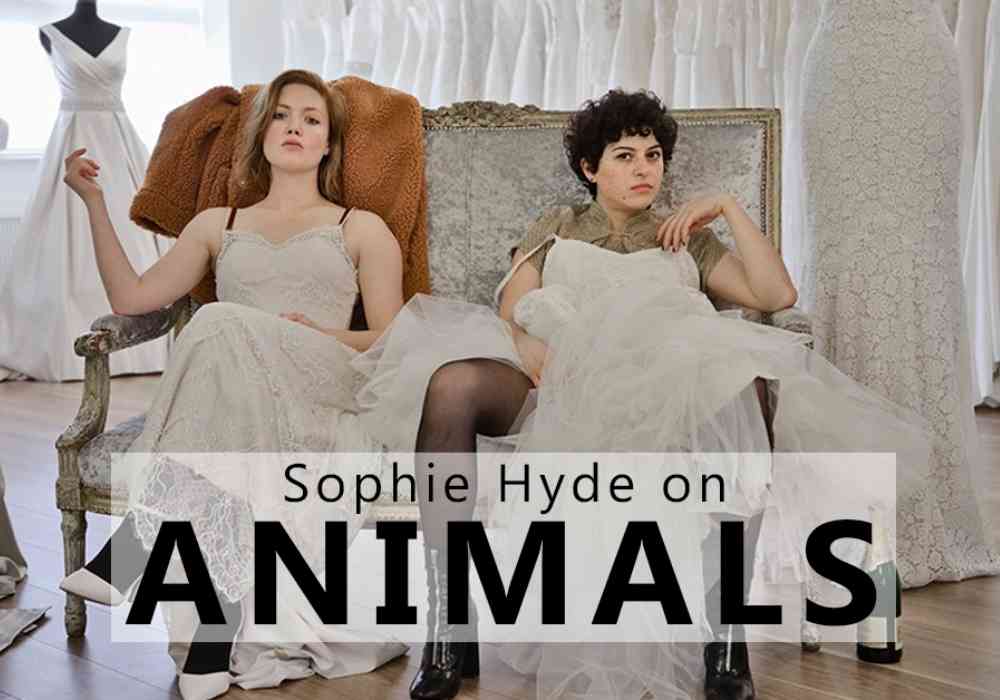Animals director Sophie Hyde on her complex, sprawling coming-of-age film starring Holliday Grainger and Alia Shawkat.

Sophie Hyde’s sophomore feature, Animals, is a messy, complicated epic of a film. “Epic” is a word more typically associated with films about long and arduous physical journeys, but it’s a completely fitting descriptor for the emotional journey in Animals. Hyde’s film tracks Laura’s (Holliday Grainger) long and life-changing transition from one stage of her life to the next: she and her drama queen best friend, Tyler (Alia Shawkat), are reckless party animals, but Laura slowly begins to reckon with her relationships (both romantic and platonic) and professional goals.
It’s a film about coming to terms with adulthood and working out what that means for you. Laura’s character arc is not a smooth curve; rather, the films tracks her uncertainty as she tries to work out how to grow up. At certain points, she thinks she’s cracked it and that’s she finally content, only to realise that life is a lot more complicated than she thought. It’s gratifying to see a film that acknowledges that coming-of-age is an ever evolving process rather than a start and end point — even by the end of the film, Laura isn’t completely sure where she stands. Grainger is magnetic in the role, embodying an outwardly charismatic woman who harbours masses of confusion and self doubt.
At the Sundance London Film Festival, I spoke to Sophie Hyde about developing two fascinating characters with two extremely talented actresses, and using creative costume and production design to create Laura’s and Tyler’s world.
Seventh Row: What was the genesis of the project?
Sophie Hyde: There was a book, Animals, written by Emma Jane Unsworth. I was sent a very early draft of the script [which was written by Unsworth], and I read the book the same day. The book really inspired me to make the film and start to talk to Sarah [Brocklehurst], the originating producer, and Emma. I loved so much of the material in the novel, and I felt like there was a real opportunity to make something.
Seventh Row: What was it that first struck you about the book?
Sophie Hyde: [The character of Laura, played by Holliday Grainger,] had these really strong desires. I felt that those were familiar. I loved that.
I loved the idea of exploring a friendship that was quite complicated, one that was really valuable but didn’t necessarily last forever, and celebrating that.
Seventh Row: Holliday Grainger and Alia Shawkat are two incredible actresses. What made you think of them for these roles?
Sophie Hyde: I just think they’re both excellent actors; that’s the starting point. If you have excellent actors, you’re set. When I talked to them, they were both really determined to tell the story, to reveal themselves, and to put themselves right inside it. That was great.
I saw something in Alia that was very Tyler that I’d never seen from her on screen before. She was playing different kinds of roles to that. With Holliday, I was super excited by the idea of seeing her as a very modern, grounded, raw woman. I felt thrilled by them as surprising choices. They weren’t obvious.
Seventh Row: Did the casting of these actresses cause the characters to change much from the initial script?
Sophie Hyde: When you start working on the film, actors transform roles in the most exciting way. I love how they change. Visually, they inhabit the writing in a different way; the character’s whole personality comes alive. They take what’s there, what I’m thinking about, and all the work that’s Emma and I have done on the characters, and they have to do it. So all these things get revealed to you.
I can’t name exactly how they changed the characters, but what happens is the character on the page, the character in your head, and the person who’s there all meld into some new thing.
Seventh Row: There’s ten years of history to the friendship in the film, and you have to build that with your actors. Did you get a chance to rehearse?
Sophie Hyde: We did. I love rehearsal. It’s really important to me, but not necessarily running scenes.
The girls didn’t know each other, so it was really important that they had time to build some sort of shared history. We did that in a sped up way where they would go out to particular places and show each other around Dublin or meet people together. We did tasks and intimacy things that weren’t too extreme but just built that shared history.
And then, as two actors, it’s sort of their job to create that. They both have such exceptional craft that they built that chemistry between themselves and with the other actors in a really strong way.
Plus, they were sort of falling in love with Dublin. We were all away, and we were all experiencing a city together. It helped.
Seventh Row: Tyler is a very specific character. A lot of her manner is very much a performance. I was wondering if you took any inspiration from people that you know or famous figures?
Sophie Hyde: We always thought that Tyler was very Withnail from Withnail and I.
I’m often drawn to a character that is a truth teller, someone who tells the truth even if it’s abrasive. There’s loads of people I know like that. That’s Tyler. She lives this really grand life.
Seventh Row: How did you work with Alia to develop Tyler’s mannerisms and the way she presents herself?
Sophie Hyde: What was really exciting in developing the work with Alia, and also with our production designer and costume designer, was the introduction of a glamour, an old world charm that I found totally captivating. She’s this very modern woman, and we could have gone really street with her, but we went to glamour.
Suddenly, she felt like loads of old Hollywood movie stars. I thought that was beautiful, because there is a veneer to her. There is a construction to that character. It was nice to be playful with that. Yet, at the same time, she’s very raw; she’s very abrasive.
Seventh Row: Your film has some of my favourite production design and costume design of the year. The spaces say so much about the characters, as do the clothes. How did you work with your production and costume designers to develop those spaces and clothes?
Sophie Hyde: I love the design of the world. Louise [Mathews], who is the production designer, and Renate [Henschke], the costume designer, just did the most amazing job.
Renate is someone that I’ve worked with before. She’s Australian, so we brought her over. She comes from a theatre background. She’s done some shows with us. I just knew that she got the girls; she understood what we were trying to do, and she wanted to be playful with it. That was really cool.
I had a strong sense that I wanted dilapidated glamour across it all: glitter but dirty. We wanted to elevate it so it didn’t just feel like it was grotty or bleak, the hangovers and everything. We didn’t want to just get grey on it. We wanted it to be rich and luscious and pleasurable to be inside of.
We met Louise because we were in Dublin. She fully embraced the idea of what we wanted to do. The girls’ apartment is an old rundown school: this massive, crazy building. They made the apartment in one of the rooms. It’s got all the old texture, but they had to build in stuff. Louise fully embraced that idea that, rather than having a little apartment somewhere that was easy to get, that we would go for this very grand thing that also felt really messy and felt like the girls.
The weird thing about Dublin is that there’s a housing crisis, and so you can’t get into places. But everyone would talk about, “Oh yeah, but my friend lives in this amazing apartment that’s been there forever.” But it was really hard to find those! So we tried to recapture and create that.
Want more Dublin-set cinema?
Paddy Breathnach’s brilliant Rosie is actually about the Dublin housing crisis.

